Drought and heat waves on top of decades of conflict have forced families in Iraq to abandon farming after generations and have left children fearful for their futures, Save the Children has warned in a report released ahead of COP28 which launches in the UAE next week.
Iraq is the fifth most vulnerable country to water and food shortages and extreme temperatures, according to the United Nations. Drought has destroyed farmland in rural areas like the Abu Al-Khaseeb district in the southern governorate of Basra, leaving communities with no income. As the drought worsens, more livestock — often a crucially important source of income for rural families — fall ill and die, forcing thousands of people to be displaced multiple times.
More than 130,000 families have been displaced in Iraq as a result of drought, according to the International Organisation for Migration. Projections show that Iraq is expected to be the ‘hottest’ country in the region by 2050, with average temperature exceeding 36 degrees Celsius.
Families in southern Iraq have faced a combination of shocks over the years including an environment damaged by years of conflict and the impacts of climate change such as rising sea levels, sandstorms, heatwaves and droughts. This ‘perfect storm’ has impacted the quality of life of thousands of children. Child poverty rates are significantly higher in rural areas where children, dependent on agriculture for their livelihoods, are disproportionately affected by risks such as child labour. The number is set to rise as a result of climate displacement and crop failure, Save the Children warns.
Trying to adapt
Fourteen-year-old Ahmed lives in Abu Al-Khaseeb with his family of five. His family has been displaced twice: first due to armed conflict in the 1990s and more recently due to the climate crisis. They originally worked in agriculture and livestock, but Ahmed’s father said their animals died due to the intrusion of salt water into their lands, which also damaged their date palms, okra and other crops. The family hasn’t cultivated their lands for two years and is now struggling to make ends meet.
“I’m worried about my future. If this situation continues, I might have to drop out of school to support my family. My dream is to become an engineer, fix the water issue and build houses for the poor,” Ahmed says.
Source : MEMO


